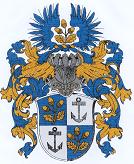History
Family tree
Coat of arms
Double surname
More information
Interesting links
Mail


Double surname
Double surname are family names that are a compound of two names. For example Van Vrijberghe de Coningh, Korthals Altes, Spahr van der Hoek, but also Tjeenk Willink is a double surname. Double names are written without hyphen, in contrast to maiden names of married women.
Initially these names arose by adding of the name of houses, country estates or heerlijkheden to the own surname after the families concerned acquired these properties, like by Ruigrok van der Werve, Van Zuijlen van Nijevelt and Pompe van Meerdervoort.
Later they are mostly combinations of the family names of de both parents of the person who created that double name and since the 19th century got consent for that by Royal Degree, like by Van Ingen Schenau and Van den Berg Jeths. Permission was given if the family (name) of the mother would become extinct. In the case of the name Tjeenk Willink there was named after a great uncle without children.
If the creation of a double name official by Royal Degree was not possible, people tried sometimes to include the family name in the birth certificate as an additional first name. The child was then after all still named for example Archibald Prins de Keizer. This trick was later prevented by a law that says that first names may not be existing surnames, unless the name is common as first name. This regulation is still enforced by registrars.
In the long run whole bunches of names did arise: Oetgens van Waveren Pancras Clifford, Binkhorst van Oudcarspel en in Koedijk, Domela Nieuwenhuis Nyegaard, Meijer Timmerman Thijssen.
A number of family names consist likewise of two separate parts, but in spite of that these names can't be considered double names. In the name Van Bergen Henegouwen is Henegouwen a further positioning of the town Bergen: not Bergen in Noord-Holland, but Bergen in Henegouwen.
Names with the adjectives Groot, Klein (Lutje), Oud (Old) and Nieuw (Nij) indicate farms, mainly in the east of the Netherlands. The names of these farms show that a new house is build by an original house: Groot Bronsvoort and Klein Bronsvoort, Kleinen Traast, Grotentraast, Lutke Schipholt, Olde Loohuis, Olde Olthuis.
In 2005 D66 suggested to also allow double surnames if the parents can't come to an agreement about the surname of their child. May this take place, people with a real double surname can in further explain daily their name is not the product of this new law.